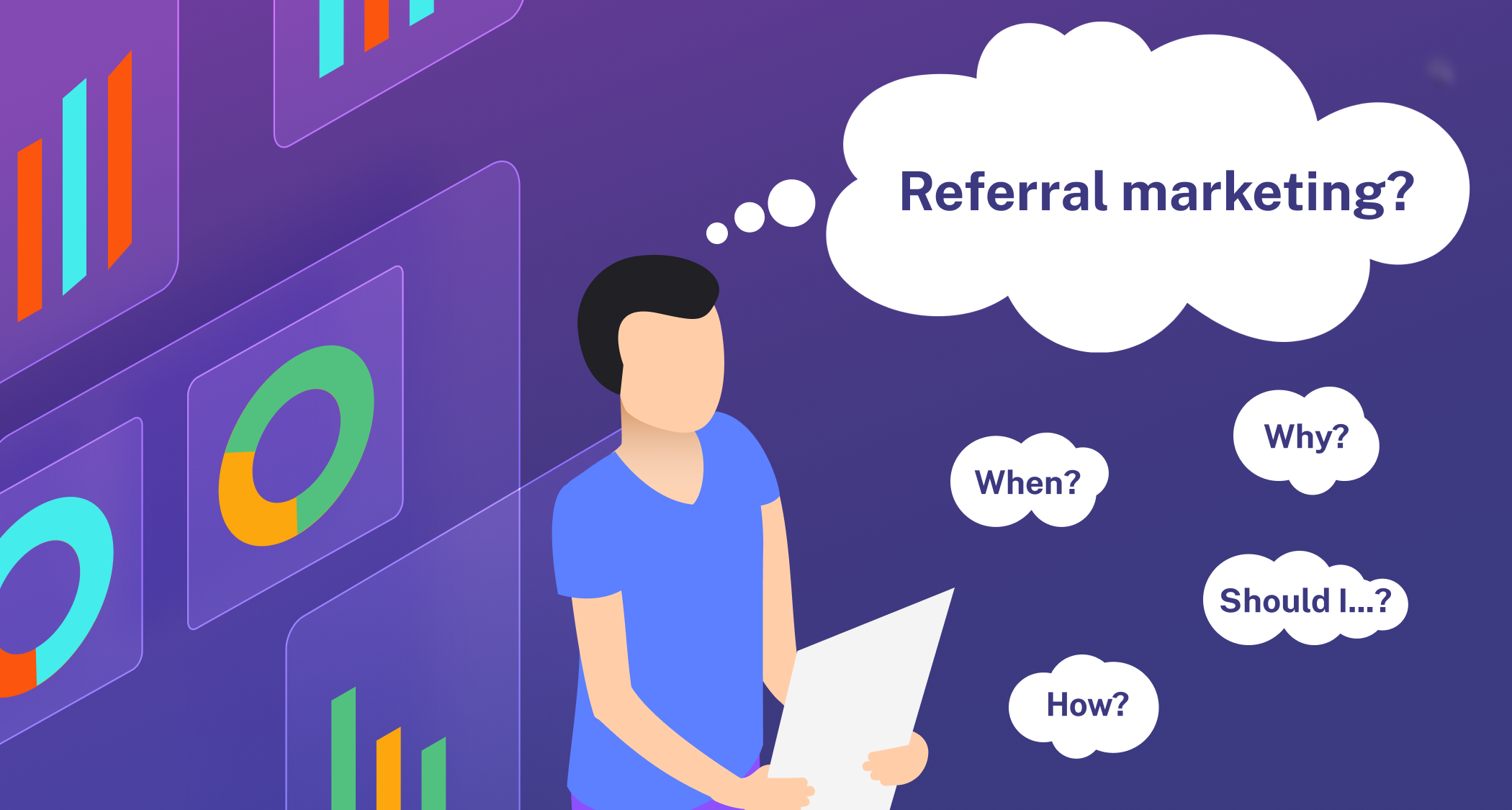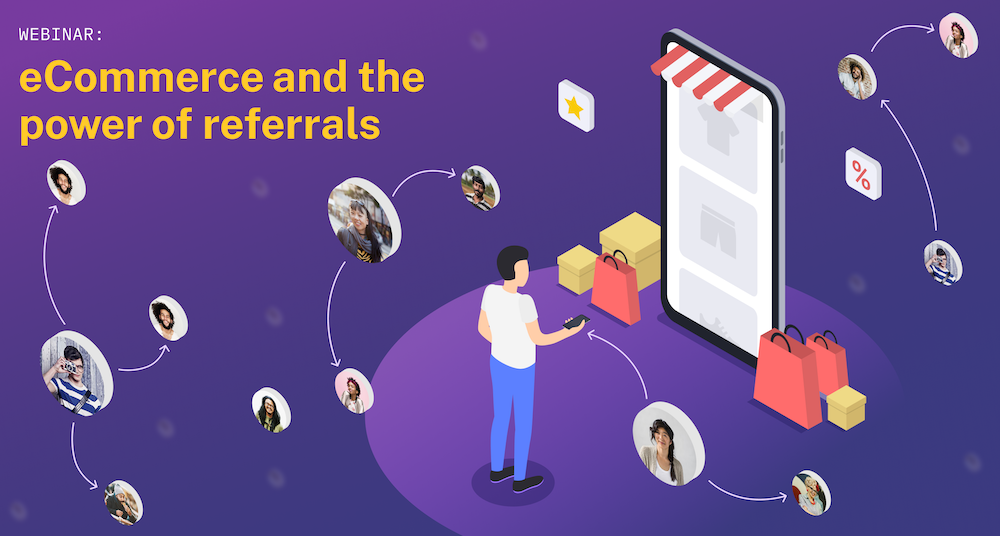Why you should focus on referral marketing
Like we’ve written up on before, referral marketing is extremely powerful. In fact McKinsey research shows that referrals influence up to 50% of all purchasing decisions. And research from ReferralCandy points out that customers acquired through word-of-mouth spend 2x more and make 2x as many referrals themselves. In other words; you wanting to get started with a referral campaign of your own is right on point. Let’s run through the basics.
What types of businesses should run referral marketing campaigns?
First of all you need to see if your business is the right fit for doing something like this. Luckily referral marketing is applicable to as good as all types of businesses. Think about it: what business doesn’t want the word about them spread by happy campers? What business doesn’t want people who have already “gotten it” to keep on returning, and bringing their friends and family along? In other words, either if you're a restaurant owner, a shoe store, a car dealership, a SaaS platform, a real estate agent or a fashion boutique - Running referral marketing campaigns is a great way to grow your business, reduce customer churn, increase revenue and build a stronger sense of loyalty to your brand.
What type of referral marketing campaigns should you run first?
Like many other aspects of running your business, it’s important to nail what the overarching goal of your referral campaign should be. Should the campaign be a one time deal for a determined period of time or an ongoing variant? The reason this is important to have reflected upon is because this will influence several of the aspects we are to get to later on in this article.
Being that this most likely is to be your very first referral marketing campaign, we suggest you start with one that is to be a one time thing. This way you have more control related to testing, as well as the added benefit of being able to focus on a specific target group in your customer base. Examples of this could be targeting only your most frequent customers, those in a specific area, or those whom you have determined in your records of being a type of VIP.
Determining the target group is crucial for the next step, that’s related to the campaigns key metrics: Is it to bring on new paying subscribers, or is it so complete a one time transaction? Are you trying to get more demos booked, or launch a brand new product or service? The reason we ask you to reflect on this, is because of the types of rewards and incentives you should provide to the ones involved in the referral process.
How should you incentivize and/or reward with your referral campaign?
There are two main ways to sort incentives/rewards related to referral marketing: one time and recurring. One time incentives are like the definition implies triggered once per desired action/conversion, and that's it. An example of this could be rewarding both your existing customer and the one they referred in, a coupon code for their next purchase.
The recurring variant is where the real power lies if you ask us. What this implies is that both the existing customer and the ones they refer, are rewarded over a certain period of time. A great example of this (which you can read more about here), is the Swedish telecom company Vimla. They run a referral campaign that rewards both the one who refers and the ones referred, by reducing the monthly bill for all of them by 10 Swedish kroner (about 1,1 US dollars). Note that this only occurs for as long as everyone involved stays on as a customer. By doing this they both increase their customer base, but also the sense of loyalty. In a way it’s a great example of a gift that keeps on giving, as long as you stay loyal of course.
As you can see there are advantages with both types. One type asks less of the ones involved, but the other also rewards more for continued loyalty over time. Once again if this is your first referral campaign, we recommend you start out with a one time variant. If it works it’s way easier to scale up based on those initial learnings, and get a recurring one up and running.
How much should you incentivize and/or reward with your referral campaign?
Regardless of how you choose to incentivize or reward, one time or recurring, you need to determine what you are to do so with and the amount of it. Are you to reward all involved parties with something related to your business, like a special offer, a coupon, a free item, etc? Or are you to provide an external reward, something like a gift card to a different business partner, a product from a local business, or a virtual Master Card perhaps? There are different reasons for going either route. In the end, the point is what do you think will nudge or trigger the desired action that you’re after? Do you want to use the incentive or reward to drive more revenue right away, or do you want to use it to reward other aspects of your existing and new customers' life? One example of this can be a real estate broker offering their recent home sellers an IKEA gift card, for referring friends or neighbours they know are considering selling their houses. Another example could be a store offering an extended period of free parking at the nearest parkings centre.
After settling on the type of reward, you need to think about the amount of it. Is the gift card to be 10 or 20 bucks? Is the coupon going to give them 30 or 50% off? Should it be a one or two day stay at the local spa? You hopefully get the point. Once again, since this is your first referral campaign, we recommend you test it out. You want to find the perfect middle ground of what you are willing to pay for loyalty and new leads compared to the cost of the rewards in question. Many businesses have this sum at hand, especially related to marketing. What is your CAC: How much are you paying today for a sign up, a lead, an order via Google, Facebook and/or LinkedIn Ads? Find this number and allocate some of these funds into this test campaign. Use it as an experiment to see what value and effect you get back, by literally giving back to your customer base, instead of funneling it to the traditional digital advertisers.
What is to be the goal of your referral campaign?
We touched on it briefly in the paragraph above, but now let's look at what you actually want your customers to refer to: Sign ups, purchases, subscriptions, surveys, bookings, basically any type of conversion you operate with today. There are different aspects of the buyer's journey you can apply the principles of referrals to. Do you want your customers to bring their friends in early in the journey perhaps? If that is the case making them bring new newsletter subscribers in can be a nice campaign goal. Or do you want them to bring their friends in later on in the journey? Then you could centre the campaign around the both of the involved parties, getting a discount on the purchase of an item or service. As you can see, you can have several different referral campaigns running in parallel, based on which customer segment you want to engage and when.
When is the perfect time to launch a referral campaign?
After running through the above mentioned aspects, the question related to timing comes up next. When should you launch or run something like this? Every customer journey has it’s touchpoints, and here you’ll have to think of when a question to your customers to spread the good word would fit in. Is it a day after their latest purchase? A week? Is it to be based on when they leave a positive review on your website? Should it be triggered manually by the sales rep perhaps? You don’t want to seem pushy, but at the same time you will want to use the momentum of a great customer experience. Once again, here you should test it out. When you have the great timing figured out, you should implement it as a standard regardless of it being triggered automatically by a system or manually by an employee.
How do you distribute a referral marketing campaign?
So now every part of this campaign is shaping up real nice, but how are you to spread it? Here we recommend two main approaches: by text message, by email or app notification. Most businesses have either of, or most likely, both of these contact details at hand for their customer base. Different people prefer to be contacted in different ways, but the main qlue here is that you use at least one of them - perhaps both, to make sure the message gets delivered. The point is that both text messaging and email are quite personal. People just don’t hand out their phone number or email address to whomever. These inboxes are guarded in many ways, so when you as a business are lucky enough to pop up in one of them (if not both), you should respect it. So when you do land in these inboxes, you should really think through how you are going to phrase and word your message.
How should you phrase your referral marketing messaging?
Get to the point, it’s as simple as that. We are all bombarded with notifications, messages, mentions and the like, so you should really reward your customers attention when you get it. Everyone knows the feeling of getting a looooong text message for example. Don’t end up in that category. Tell them why they should care, what they need to do and where they need to go to do so. Here’s an example of one such text message, from a mobile phone service provider:
“Hello [Customers first name]! Want more free gigabytes from your monthly phone plan? 📲 And give the same amount of free gigabytes to your friends? Follow this link to learn more [Landing page link]!”
Short and sweet. As you can see the wording focuses on the person (customer) in question, and from there how they can bring value to their friends as well. The art of how you should word and phrase your actual landing page copy and content, we will soon have a dedicated blog post about. In other words, keep your eyes posted on our channels so you don’t miss it.
What is the best solution you can use to set up referral marketing campaigns?
As a shock to no one, we at Smoc like to bring up our referral marketing solution when this question arises. This isn’t only to tout our own horn, but because we know for a fact that there isn’t another solution like this on the market. A solution that lets you as a SMOC client easily create engaging and rewarding referral conversations, that guide your target audiences from leads to ambassadors. That’s the really short and sweet version of it, but instead of writing about it, we would much rather actually show it to you. Seeing is believing right? If that sounds interesting you can either book a meeting with us via this link, or check out our webinar “eCommerce and the power of referrals” by clicking here. Hope to talk to you soon!



